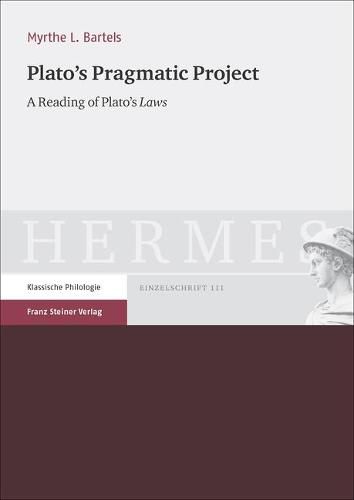Readings Newsletter
Become a Readings Member to make your shopping experience even easier.
Sign in or sign up for free!
You’re not far away from qualifying for FREE standard shipping within Australia
You’ve qualified for FREE standard shipping within Australia
The cart is loading…






When we think about Plato’s philosophy, his Laws is usually not the first work that comes to mind. Plato’s final magnum opus is a perplexing text in many ways, even apart from the fact that its very existence forces us to reflect on the question of how it relates to Plato’s other major political work, Republic. The debate about Plato’s Laws usually disregards its composition and the way in which the legislation takes shape in the dialogue. This book offers a fresh reading of Plato’s Laws that treats its form as an integral part of its philosophy, and asks what the way in which Plato’s legislative project is given shape in the text suggests about the status of that project. It argues that the legislative project is strikingly pragmatic for a work of Platonic philosophy and should therefore be understood in its own terms. Rather than laying down a definitive law code for a new colony (Magnesia) that is based on, or at least in some way presupposes, a metaphysical norm, Plato’s last work creates its own moral framework, in which lawgiving provides a convenient practical test for a notion of virtue understood as social conditioning.
$9.00 standard shipping within Australia
FREE standard shipping within Australia for orders over $100.00
Express & International shipping calculated at checkout
Stock availability can be subject to change without notice. We recommend calling the shop or contacting our online team to check availability of low stock items. Please see our Shopping Online page for more details.
When we think about Plato’s philosophy, his Laws is usually not the first work that comes to mind. Plato’s final magnum opus is a perplexing text in many ways, even apart from the fact that its very existence forces us to reflect on the question of how it relates to Plato’s other major political work, Republic. The debate about Plato’s Laws usually disregards its composition and the way in which the legislation takes shape in the dialogue. This book offers a fresh reading of Plato’s Laws that treats its form as an integral part of its philosophy, and asks what the way in which Plato’s legislative project is given shape in the text suggests about the status of that project. It argues that the legislative project is strikingly pragmatic for a work of Platonic philosophy and should therefore be understood in its own terms. Rather than laying down a definitive law code for a new colony (Magnesia) that is based on, or at least in some way presupposes, a metaphysical norm, Plato’s last work creates its own moral framework, in which lawgiving provides a convenient practical test for a notion of virtue understood as social conditioning.